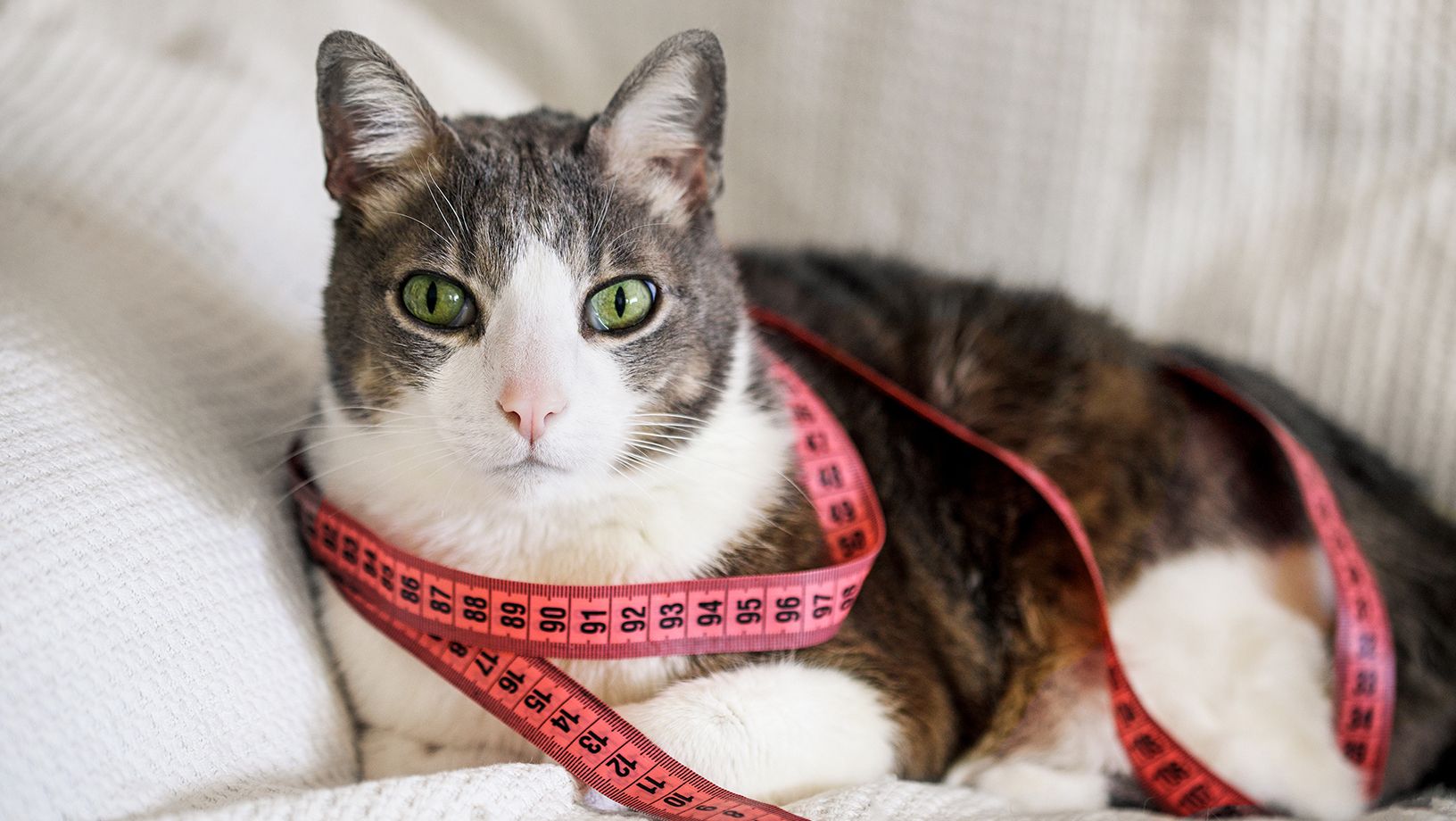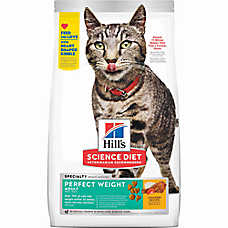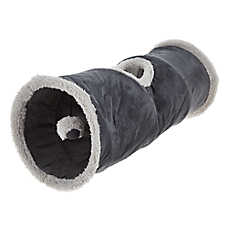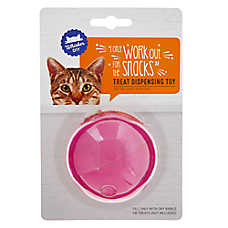Is it Time for Weight Control Cat Food?

In this Article
While a chubby cat may be irresistibly cute, the extra pounds on your kitty’s frame can lead to serious health issues. Obesity in cats is often directly connected to feline diabetes, joint pain, high blood pressure and urinary disease. If your feline friend has lost their natural figure, it may be time to consider weight control cat food.
What is weight control cat food?
Weight control cat food is specially formulated to help cats maintain or lose weight. It provides all the essential nutrients your cat needs and includes fewer calories to help to prevent or treat obesity.
The typical nutrient profile of weight control cat food includes:
- Fewer calories: weight control food is formulated to have fewer calories per serving to reduce your kitty’s overall calorie intake.
- Higher fiber: With more fiber in each bite, your cat will feel full longer, reducing its urge to overeat.
- More protein: A higher percentage of protein in weight control cat food supports lean muscle mass and provides the energy your cat requires.
- Less fat: Lower levels of fat in the food help reduce calorie intake while still providing essential fatty acids.
- Balanced nutrients: Weight control cat food contains all the essential vitamins, minerals, and amino acids your cat needs to ensure complete nutrition.
When to switch to weight control cat food
You should always consult your veterinarian before making any changes to your cat’s diet. Here are a few signs that it might be time to have that conversation.
- Your cat is overweight or obese: If you feel your cat is packing on the pounds, check with your vet to confirm that your cat is actually overweight and to discuss a weight control diet.
- Your cat is slowing down: When you notice that your cat has become less active, you may consider changing food to prevent weight gain.
- Your cat lives only indoors: Because indoor cats are more likely to have a sedentary lifestyle, you might consider choosing weight control cat food as a preventive measure.
- After neutering or spaying: Cats often gain weight after being neutered or spayed because of hormonal changes.
- Your cat has reached its golden years: Your cat’s metabolism and activity will slow in its senior years – somewhere between 7 to 10 years of age. Many senior cat food products are formulated to help with weight control. A combination of senior wet cat food and dry cat food will offer your cat a delicious yet balanced diet.
Choosing the right weight control cat food
When choosing weight control food with your veterinarian, you’ll want to look for a product that meets these guidelines. The best cat food for weight loss will include:
- Protein content: Protein is important to help keep your cat feeling full in between meals.
- Low fat content: While some fat content is necessary, look for weight control formulas that reduce fat content to minimize calorie intake.
- High fiber: Look for foods with added fiber from sources like beet pulp or cellulose.
- L-Carnitine: This amino acid can help boost metabolism and weight loss.
- Lower calories: Your weight control cat food should offer lower calories per serving than your current cat food.
- Wet cat food: Wet cat food can help with weight control since it offers fewer calories per serving while also helping your cat stay hydrated. · Quality ingredients: Choose products with high-quality ingredients and make sure your cat is getting the proper nutrients and benefits they need from their food.
- Veterinarian recommendations: The best weight control cat food is one that’s recommended by veterinarians or meets the standards of regulatory agencies that govern pet food.
Alternate weight loss strategies
In addition to switching to weight control cat food, you can try these strategies to help your cat lose or maintain weight.
- Increase activity: Spend playtime each day with your kitty using cat toys, laser pointers or interactive playsets like cat tunnels to encourage physical activity.
- Puzzle feeders: Puzzle feeders make your cat work harder for its food, increasing physical activity and causing it to eat more slowly.
- Cut down on high-calorie treats: While cat treats bring great joy, they also add more calories. Try replacing high calorie treats or food toppers with healthier alternatives.
FAQs
What’s the best wet cat food for weight loss?
The best wet cat food for weight loss includes:
- Royal Canin Ultra Light – it’s low in calories and high in protein to support weight loss.
- Hill's Science Diet Adult Perfect Weight Canned Cat Food – it’s designed to help cats achieve a healthy weight with clinically proven results.
- Wellness CORE Grain-Free Weight Management Canned Cat Food – it’s high-protein, grain-free formula aids in weight loss and overall health.
What’s the best weight loss dry cat food?
Some of the top-rated dry cat foods for weight loss include:
- Hill's Science Diet Adult Perfect Weight, which is formulated with natural ingredients and clinically proven for weight management.
- Blue Buffalo Weight Control, which contains high-quality protein and L-Carnitine to support lean muscle and weight loss.
- Purina Pro Plan Adult Weight Management, which features high protein and low fat to promote healthy weight loss while maintaining muscle mass.
How can I tell if my cat is overweight?
To determine if your cat is overweight, run your hand along your cat’s sides – if you can’t feel the ribs easily, your cat may be overweight. Also, you should see noticeable waste behind the ribs when looking at your cat from above, or a tuck in the belly area when viewing from the side.
How can I get my indoor cat to lose weight?
Switching to weight control or weight management cat food helps to reduce calorie intake while helping your kitty still feel full. You can also increase activity through daily play sessions and limit high-calorie treats.
What are the health risks of cat obesity?
Obesity can lead to several serious health issues, including diabetes, arthritis, heart disease, respiratory issues and liver disease.
Can wet cat food help my cat to lose weight?
Wet cat food can be helpful for weight loss because it usually has fewer calories per gram than dry food. Its high-water content can help your cat feel fuller while eating less. And because it is high in protein, it can help maintain muscle mass during weight loss.
What should I do if my cat refuses to eat weight control cat food?
When switching to a weight control food, it’s important to go slowly. Make the transition over 7 to 10 days, gradually increasing the amount of new food each day. You can try warming the food to enhance its aroma, or experiment with different flavors or brands of weight control cat food. It is important that you ensure your cat is still eating during this transition period. As such, you can also try mixing wet and dry food – some cats prefer one type over another. Adding a small amount of a favorite treat or a little bit of tuna juice as a food topper may entice your cat to eat the new food.
How often should I weigh my cat during a weight loss program?
Weighing your cat weekly during a weight loss program allows you to make any necessary adjustments to its diet and feeding plan. Once your cat reaches its target weight, a monthly weigh-in is appropriate.
Need other cat supplies while you’re shopping for weight control cat food? PetSmart also carries cat litter, litter boxes, cat toys, cat beds & furniture, cat flea & tick treatments and much more. Explore PetSmart’s Cat Shop to find everything your cat needs, all in one place.
PetSmart offers convenient shopping with Curbside Pickup or in-store pickup. Need something today? We have select items available for Same-Day Delivery in most areas powered by DoorDash.
For items you purchase frequently, PetSmart has Autoship that automatically delivers the items you want to your door as often as you’d like. Check the website to see which items are eligible.
Information in this article is not intended to diagnose, treat or cure your pet and is not a substitute for veterinary care provided by a licensed veterinarian. For any medical or health-related advice concerning the care and treatment of your pet, contact your veterinarian.







